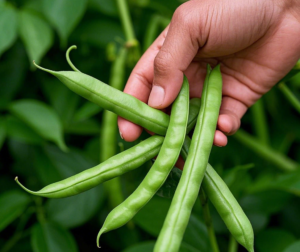The Nutritional Powerhouse Behind This Versatile Veggie
Green beans, also known as snap beans or French beans, are a staple in kitchens worldwide. These vibrant, crunchy vegetables aren’t just a tasty addition to stir-fries, salads, or casseroles—they’re also packed with essential nutrients that support overall health. In this guide, we’ll explore why green beans deserve a spot on your plate, from their nutritional benefits to creative ways to enjoy them.

Green beans are low in calories but high in vitamins, minerals, and antioxidants. Here’s a breakdown of their key nutrients:
- Vitamin C: Supports immune function and collagen production.
- Vitamin K: Essential for blood clotting and bone health.
- Folate (Vitamin B9): Crucial for cell growth and DNA synthesis.
- Potassium: Regulates blood pressure and heart function.
- Dietary Fiber: Aids digestion and helps you feel full.
- Antioxidants: Like lutein and zeaxanthin, which protect against oxidative stress.
One cup (125 grams) of cooked green beans contains only 31 calories, making them an excellent choice for weight management.
Green beans are rich in soluble and insoluble fiber. Soluble fiber absorbs water, promoting regular bowel movements, while insoluble fiber adds bulk to stool, preventing constipation. A healthy digestive system also supports gut bacteria, which plays a role in mental health and immune function.
The potassium, folate, and antioxidants in green beans work together to protect heart health. Potassium helps balance sodium levels, reducing blood pressure, while folate lowers homocysteine levels—a marker for heart disease. Antioxidants like flavonoids combat inflammation and oxidative damage to blood vessels.
Thanks to their low calorie and high fiber content, green beans are a dieter’s dream. Fiber slows digestion, keeping you full longer and curbing overeating. Pair them with protein-rich meals (e.g., grilled chicken or tofu) for a satisfying, balanced dish.
Green beans contain calcium, magnesium, and vitamin K—key nutrients for maintaining strong bones. Vitamin K activates osteocalcin, a protein essential for calcium absorption. Regular consumption may reduce the risk of osteoporosis, especially in postmenopausal women.
The fiber in green beans slows carbohydrate digestion, preventing spikes in blood sugar levels. This makes them a great choice for people with diabetes or those at risk of developing it. Pair them with healthy fats (e.g., olive oil) to further stabilize blood sugar.
To preserve their nutrients and crunch, avoid overcooking green beans. Here are popular methods:
- Steaming: Steam for 3–5 minutes until tender-crisp.
- Stir-Frying: Sauté with garlic and sesame oil for a quick, flavorful side.
- Roasting: Toss with olive oil and spices (e.g., paprika, Parmesan) and roast at 400°F (200°C) for 15–20 minutes.
- Raw in Salads: Slice into thin strips for a fresh, crunchy addition.
Pro Tip: Blanching green beans in boiling water for 1 minute before shocking them in ice water locks in their vibrant color and nutrients.
- Mediterranean Style: Toss with cherry tomatoes, feta, and balsamic glaze.
- Asian-Inspired: Add to fried rice or noodles with soy sauce and ginger.
- Crudités Platter: Serve with hummus or ranch dip for a healthy snack.
- Grilled: Toss with olive oil and char on a grill for smoky flavor.
Q: Are green beans safe for everyone?
A: Most people can enjoy green beans, but those with kidney issues should limit intake due to their oxalate content.
Q: How long do green beans stay fresh?
A: Store unwashed in a sealed bag in the refrigerator for up to 5 days.
Q: Can I freeze green beans?
A: Yes! Blanch for 3 minutes, cool, and freeze in airtight containers for up to 1 year.
Green beans are more than just a side dish—they’re a nutritional powerhouse that supports digestion, heart health, and weight management. Whether steamed, roasted, or added to your favorite recipes, incorporating green beans into your diet is a simple way to boost your health. Try experimenting with different cooking methods and flavor pairings to keep meals exciting!

